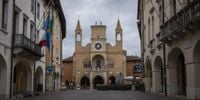In a decisive electoral victory for the center-right coalition, Luca Fasan has been elected as the new mayor of Monfalcone, securing 8,272 votes, which translates to an impressive 70.87% of the total ballots cast. This significant win was confirmed on April 15, 2025, amidst a backdrop of shifting political dynamics in the region.
Fasan's victory comes as part of a broader trend in the Friuli Venezia Giulia region, where the center-right has solidified its position in multiple municipalities. Diego Moretti, the candidate from the center-left coalition, managed to garner 3,057 votes, or 26.19%, while Bou Konate, representing the Islamic list "Italia Plurale," received only 343 votes, accounting for 2.94%. This outcome highlights the challenges faced by new political movements in the area.
According to reports, Fasan's support came from a coalition that included the League, Brothers of Italy, Forza Italia, and additional local lists. His election marks a continuation of the center-right's dominance in Monfalcone, a city that has seen significant political shifts in recent years, particularly under the previous administration of Anna Maria Cisint, who is now serving in the European Parliament.
While Fasan celebrated his victory, the results for Konate's list were disappointing. Initially viewed as a potential breakthrough for Islamic representation in local governance, the performance of "Italia Plurale" fell short of expectations, raising questions about the viability of such movements in a region characterized by a substantial foreign population, primarily from Bangladesh.
In Pordenone, another key municipality in the region, Alessandro Basso, also from the center-right, achieved a significant win, capturing nearly 54% of the votes. Basso, a regional councilor and member of Brothers of Italy, will replace the outgoing mayor Alessandro Ciriani, who was elected to the European Parliament last year. Nicola Conficoni, the candidate from the center-left, received approximately 36% of the votes.
The electoral results reflect a broader trend of increasing support for the center-right across Friuli Venezia Giulia, as evidenced by the election outcomes in Nimis, where Fabrizio Mattiuzza was elected mayor with 63.55% of the votes, defeating Sergio Bonfini, who received 36.45%.
In Monfalcone, Fasan's election is particularly significant given the city's demographic landscape. Approximately one-third of Monfalcone's population consists of foreign residents, many of whom are from Bangladesh, a country with a predominantly Muslim population. This demographic reality adds complexity to local political dynamics, especially as the previous administration adopted a rhetoric that was often critical of Islamic practices.
Fasan's coalition has emphasized traditional values and local governance, which resonates with a significant portion of the electorate. However, the low turnout for the Islamic list suggests a disconnect between the political aspirations of some community members and the broader electorate's preferences.
In the aftermath of the elections, Anna Maria Cisint commented on the electoral results, stating, "We will send the Islamic list back to the sender, even though it raises an important issue concerning Islamization, which I combat alongside others because only in this way can we as a city and as a people have a future." This statement illustrates the contentious atmosphere surrounding issues of immigration and integration in Monfalcone.
As the new mayor, Fasan faces the challenge of addressing these demographic tensions while also fulfilling the expectations of his supporters, who largely favor policies that prioritize local interests. With a significant percentage of foreign residents, the new administration may need to navigate the complexities of multicultural governance more carefully than its predecessors.
The election results have sparked discussions about the future of local governance in Friuli Venezia Giulia, particularly as the center-right continues to consolidate its power. Observers are keen to see how the new administrations in Monfalcone and Pordenone will address the needs of their diverse populations while maintaining the support of their core constituents.
Overall, the recent elections in Friuli Venezia Giulia highlight a critical moment in the region's political landscape, as the center-right coalition demonstrates its resilience and ability to appeal to voters amidst changing demographics and societal expectations. As Fasan and Basso take office, their leadership will undoubtedly shape the future of local politics in a region that is navigating the complexities of modern governance.





